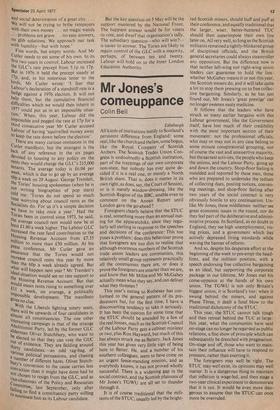Mr Jones's comeuppance
Colin Bell
Edinburgh All kinds of institutions testify to Scotland's persistent difference from England: some real, like the church and the law, somebogus, like the Royal Company of Scottish Archers. The Scottish Trades Union Congress is undoubtedly a Scottish institution, part of the trappings of our own corporate non-state, but nobody has ever quite decided if it is a real one, or merely a North British sham. That is, does it matter in its own right, as does, say, the Court of Session, or is it merely window-dressing, like the Scottish Region of the BBC, unable even to comment on the Annan Report until London gave the go-ahead?
Foreigners clearly believe that the STUC is real, something more than an annual outing for the apparatchiks, since they regularly sell sterling in response to the speeches and decisions of the conference: This too poses a problem: does this behaviour prove that foreigners are too dim to realise that although enormous numbers of the Scottish trade union leaders are communists, this relatively small group represents practically all the communists there are, or does it prove the foreigners are smarter than we are, and know that Mr Milne and Mr McGahey actually mean what they say, and can deliver what they threaten ?
This year's outing to RothesaY has conformed to the general pattern of its predecessors but, for the first time, I have a disconcerting tendency to take it seriously. It has been the custom for some time that the STUC should be attended by a few of the real bosses, much as the Scottish Council of the Labour Party gets a cabinet minister or two, plus Ron Hayward, but much of this has always struck me as flattery. Jack Jones this year has given very little sign of being here to flatter. He, and a number of his southern colleagues, seem to have come on an urgent fence-mending mission, and as everybody knows, it has not proved wholly successful. There is a widening gap in the social contract, and the Scottish platoons of Mr Jones's TGWU are all set to thunder through it.
It is of course traditional that the militants of the STUC, usually led by the bright
red Scottish miners, should huff and puff at their conference, and equally traditional that the larger, wiser, better-buttered TUC should then superimpose their own line later on. All very well, so long as the Scottish militants remained a tightly-blinkered group of disciplined officials, and the British general secretaries could always steamroller any opposition. But the difference now is that neither left-wing nor right-wing union leaders can guarantee to hold the line: whether McGahey means it or not this year, the Scottish miners do, and it will take quite a lot to stop them pressing on to free collective bargaining. Similarly, as he has just found out, Mr Jones's 'great prestige' can no longer sweeten nasty medicine.
It follows that the leaders who have struck so many earlier bargains with this Labour government, like the Government itself, have lost much of their credibility with the most important section of their movement: not the professional officials, who may or may not in any case belong to some minute conspiratorial grouping, nor of course the vast and unassertive majority, but the earnest activists, the people who keep the unions, and the Labour Party, going up and down the country. Shop-floor feeling is moulded and reported by these men, those who are prepared to undertake the tedium of collecting dues, posting notices, convening meetings, and shop-floor feeling after two years of the social contract is very obviously hostile to any continuation. Unlike Mr Jones, these middlemen neither see great economic issues in the round, nor do they feel part of the deliberative and administrative process. In Scotland, as no doubt in England, they see high unemployment, rising prices, and a government which has actively depressed living standards while waving the banner of reform.
And so, despite his desperate effort at the beginning of the week to pre-empt the headlines, and the militant position, with a speech endorsing free collective bargaining as an ideal, but supporting the corporate package in our lifetime, Mr Jones met his come-uppance at the hands of his own union. The TGWU is not only Britain's biggest union, it is Scotland's too: when it swung behind the miners, and against Phase Three, it dealt a fatal blow to the traditional dichotomy of the STUC.
This year, the STUC cannot talk tough and then retreat behind the TUC at large: this year, what the communists have said on-stage can no longer be regarded as public relations, a fine show of principle which can subsequently be drenched with pragmatism. On-stage and off, those who want to maintain their influence will have to respond to pressure, rather than exerting it.
The foreigners may well be right. The STUC may well exist, its opinions may well matter. It is a dangerous thing to maintain that inflation is wage-led, and then stage a two-year clinical experiment to demonstrate that it is not. It would be even more dangerous to assume that the STUC, can once more be overruled.


































 Previous page
Previous page